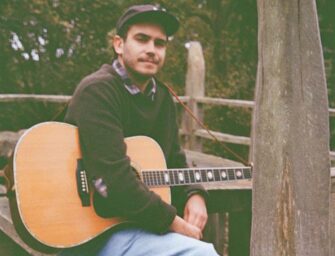Author of ‘The Art Of Songwriting’ Ed Bell suggests how to decide what to write about and become more prolific
It’s one of the biggest questions every songwriter has to figure out: what to write about. And while there are no rules – other than to write about something you’re passionate about – there are a few things you should know that can help you come up with your next killer song idea. We’ll take a look at a few of these before I share with you a foolproof technique for coming up one hundred great song ideas – even if you’ve never written a song before.
SONGS TELL STORIES
It sounds too simple to be true, but it’s simple and true. Virtually every song is based on a story. There’s a situation. There are people involved. There are things those people do, want or think. And these are the ingredients of great stories.
Don’t get me wrong. I’m not saying your next song needs to start ‘Once upon a time’ and be an epic quest about life, death and overcoming impossible odds. You can save those kinds of stories for the movies.
Songs’ stories are usually simple. They’re sometimes very simple. They’re sometimes daft, nonsensical or just plain weird. But there are three kinds of song stories that make up the majority of the songs you already know:
1) The ‘to someone’ song
Think Adele’s Hello, Charlie Puth’s Attention or the bazillion love songs ever written. In this type of song somebody (usually one person) says something to somebody else (usually also one person). They’re the story of one person’s relationship with someone else, and by putting it in song we all get a front-row seat to what’s going on.
2) The ‘about someone’ song
Think Ed Sheeran’s Galway Girl, Clean Bandit’s Rockabye or Camila Cabello’s Havana. In this type of song, instead of a song happening in front of us, we hear someone’s telling of it. Sometimes that story involves the person singing it (Galway Girl) or doesn’t (Rockabye mostly doesn’t, though maybe the chorus does). They might be the story of one person’s relationship with someone else, but we hear about it second hand.
3) The ‘to everyone’ song
Think Pharrell’s Happy, The Black Eyed Peas’ Where Is The Love? or 50 Cent’s P.I.M.P. This type of song is usually about broadcasting a message – or maybe a question – to the world. Maybe it’s an artist who has something to say to their fans, or wants to set the record straight with a public service announcement. Instead of a specific ‘to someone’ message, whoever’s singing the song is just sharing something they want everyone to know about. It’s often a kind of ‘about someone’ song, but the ‘someone’ is the artist themselves.
Now, before you get carried away, these are not the only types of song that exist. You’ll find songs that aren’t quite any of these or that mash up two (or more) of these in their own way. But if you’re not sure where to start when it comes to looking for your next song idea, picking one of these categories and trying to come up with your own story that fits it is a really great start.
So that in mind, let’s look at some of the places you might find some great stories.
WHERE TO LOOK
Since life inspires art, the best place to look for great song ideas is real life. A good place to start is your life. What has happened to you that’s worth singing about? What are the most interesting or emotionally charged things that have been a part of your life? They don’t have to be extraordinary. Something that’s simple, relatable – ‘You know you can call on me’, ‘He’s only calling ‘cause he’s drunk and alone’, ‘Today I don’t feel like doing anything’ – works just great.
Speaking of which, another great place to start is other people’s lives: the people you know, the people they know, the people you hear about online.
The key thing is that not every idea you find will be a great one. You don’t need to challenge yourself to write a song about a bus crash, or a drop in the stock market or your neighbour’s pet rock collection. Unless you want to.
You’re just looking for inspiration. You’re looking for real-life stories you can mould, tweak and adapt into the kind of song you want to write. You’re looking to steal the real-life ideas that excite you, do your own thing with them, and see where that takes you.
It’s good to be inspired by real life, but you don’t have to document it literally. Some people call this ‘artistic licence’, but I just call it ‘writing a good song’. It’s the BBC’s job to record the truth. We’re just trying to make great art.
GIVE IT A TWIST
Coming up with great song ideas, like every part of songwriting, is a skill. And like every skill, it’s something you get better at the more you do it. With practice, you’ll home in on the simple, common elements that tend to make a song idea work – some of which we’ve talked about already.
But if in doubt, as promised, I’m going to share with you a foolproof technique for coming up with new song ideas. Even if this is your first song. And without needing someone else’s list of song prompts to get started.
So, not only do songs tell stories, but the hallmark of a good song story is that you can summarise it in a single sentence. Seriously, you can summarise virtually every great song this way. (And if you didn’t know that, you’ll learn a lot if you have a go.)
And the simple technique that lets you turn one of these song ideas into your own? Give it a twist. Take the song’s story idea and change one detail about it. Write a song about a guy who gets back in touch with an ex after a long time. Or write a song about a girl who gets back in touch with an ex after a short time. Or write a song about a girl who wants to get back in touch with her ex but she’s too scared to do it. This technique might sound really basic, but try it: it works.
And if you were wondering, no, you’re not ripping off someone else’s idea. You’re not being unoriginal. You’re not infringing anyone’s copyright.
New ideas come from old ideas. Everyone is ripping off the idea of someone, somewhere, sometime. Original ideas are existing ideas with a twist. And there’s no copyright on ideas – only the specific way someone realises an idea.
In any case, this technique is really effective because it forces you to come up with something new. Changing even one tiny detail about a song idea forces you to change all other kinds of details in the rest of your song to make it work.
You couldn’t just take Adele’s Hello and swap every ‘she’ for ‘he’ and say voilà. A song for a guy getting in touch with his ex would need a completely different lyric than a song for a girl, and it would sound completely different. You’d have completely different things to say to someone you broke up with last week than to someone you broke up with three years ago.
You get the idea: changing even one detail about a song idea forces you to write a completely different song. And coming up with 100 new song ideas just means repeating this process 100 times.
So, if in doubt, give it a go. Try and summarise some of your favourite songs in a single sentence. Then give those sentences a twist. And see where that twist leads you. What does that song sound like? And what words does that lyric have in it?
And that’s why the ‘give it a twist’ technique is powerful. It forces you to think for yourself. It forces you to do something original.
And the more you use it, the better and bigger twists you’ll come up with and the more original you’ll be. Eventually, you’ll get so good at making new ideas out of old ideas we won’t be able to keep tabs on which old ideas you’ve been recycling – and eventually, neither will you.
Ed Bell is a songwriter and educator who writes primarily for theatre and film. He created The Song Foundry, an online resource site for songwriters, in 2014. The Art of Songwriting is available in paperback and on Kindle. For more information, take a look at edbell.com
Read more songwriting tips here



































Related Articles